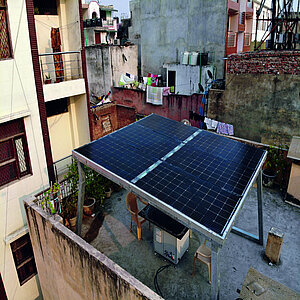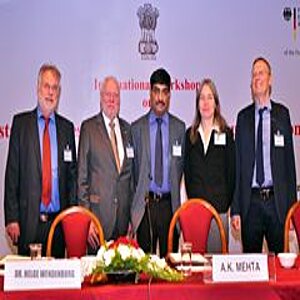Germany and India to intensify their cooperation

Joint statement of environmental protection adopted by both governments.
At the third Indo-German government consultations, which were held in New Delhi and headed by German Federal Chancellor Dr Angela Merkel and Indian Prime Minister Narendra Modiwere, Germany and India agreed to intensify their cooperation on the environment, particularly with regard to mitigating climate change. In a joint statement, both parties agreed to adopt a global climate change agreement in Paris, with the aim of keeping the average increase in global temperatures below 2 degrees Celsius. In addition to the joint statement on climate change, the two countries also agreed to intensify their cooperation in the areas of biodiversity conservation and waste and water management.
State Secretary for the Environment, Jochen Flasbarth, who represented the German Federal Ministry for the Environment, Nature Conservation and Nuclear Safety (BMUB) at the consultations, said 'This agreement is another important step forward in the run-up to the Paris climate conference in December.' He welcomed the announcement last week of the Indian Intended Nationally Determined Contribution (INDC), in particular because of its ambitious goals for renewable energies and energy efficiency. 'All the major emitters have now submitted their contributions. This is an extremely significant signal for the climate change conference in Paris.'
In the joint statement on climate change mitigation, both countries confirm their commitment to improving energy efficiency and attaching greater importance to the use of renewable energies as a substitute for fossil fuels. They both emphasise their conviction that climate change adaptation should form a key element of the Paris resolutions. The cooperation work is to be supported through two new structures: a bilateral working group under the umbrella of the already existing Indo-German Environment Forum, and an Indo-German Climate and Renewables Alliance, in which all relevant actors from the two countries are to be represented.
Together with the Special Secretary of the Indian Ministry of Environment, Hem Kumar Pande, Flasbarth visited Nagarhole National Park in Karnataka state. Flasbarth suggested that the BMUB could provide support for Indian and African national park operators to exchange experiences as a means of combating poaching. India has made considerable progress in this area over the past few years.
Flasbarth praised the Indian Smart Cities Initiative, saying 'The ambitious programme is impressive, both in terms of its scope and the short timescale set for implementing it.' The Indian government is planning to finance the Smart Cities Initiative through a series of public-private partnerships, for which the central government is providing around 6.5 billion euros over a period of five years. 98 of the 100 smart cities had been named by the end of August; 20 of these are to be selected by the end of January 2016 for consideration in the first round of funding.
Flasbarth announced that the BMUB would soon provide more precise details of its support for the programme: 'My colleague, State Secretary Gunther Adler, will provide more specific details of the German support for the Smart Cities Initiative at the next meeting of the Indo-German working group in late February 2016.'
The aim is to set up a project through the International Climate Initiative that will provide targeted support to India in implementing the initiative, with additional, specific local support if needed. Flasbarth also noted that several German companies are already heavily involved in negotiations to become involved in implementing the Smart Cities Initiative.
The link has been copied to the clipboard
Contact
IKI Office
Zukunft – Umwelt – Gesellschaft (ZUG) gGmbH
Stresemannstraße 69-71
10963 Berlin
Related Publications
-
 05/ 2022 | IKI Evaluation
05/ 2022 | IKI EvaluationSolar Mapping and Monitoring (SolMap)
German with executive summary in English (PDF, 1 MB)
















